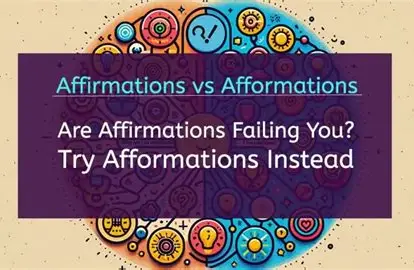Categories
Interpersonal Skills, Professional Development, Personal DevelopmentPublished August 18, 2025
Affirmations or Afformations? That Is the (Surprisingly Scientific) Question

Let’s talk to ourselves—but make it productive.
You’ve probably heard of affirmations: those mirror-mantras that promise to shift your reality by sheer repetition. “I am successful.” “I attract wealth.” “I have six-pack abs.” (While holding a donut.) But have you heard of afformations? Spoiler: They’re not typos. They’re turbo-charged affirmations—and they just might work better.
So what’s the deal, and what does science have to say about this woo-meets-neuroplasticity movement?
Affirmations: The OG Mindset Reprogramming Tool
Affirmations are simple, positive statements that declare a desired state of being. Think of them as mindset conditioning. According to neuroscience, repeating affirmations lights up the brain’s reward centers (hello, ventromedial prefrontal cortex), especially when the statements align with your values.
In fact, a 2016 study in Social Cognitive and Affective Neuroscience showed that affirmations can increase activity in regions of the brain associated with self-processing and valuation. Translation? They make you feel good and motivate action—if you believe them.
But here’s the catch: If you say, “I am a millionaire real estate agent,” and your bank account laughs back at you, your brain might rebel. This is called cognitive dissonance, and it can sabotage the feel-good effect.
Afformations: The Jedi Mind Trick Your Brain Loves
Enter afformations, coined by Noah St. John. Instead of declaring something that may feel untrue, you ask a question as if it already were true. For example:
-
“Why am I so successful in attracting dream clients?”
-
“Why does my business keep growing even when I take time off?”
Your brain, a naturally curious pattern-seeker, has to answer questions. So instead of fighting against a bold (and possibly unbelievable) affirmation, it starts looking for evidence to support your new empowering question.
It’s like reverse psychology… on yourself.
The Science Behind the Magic
While afformations are newer to the research scene, their effectiveness is rooted in self-affirmation theory and the question-behavior effect—a phenomenon where asking people questions about a future behavior increases the likelihood they’ll act accordingly.
Psychologist John Bargh has also shown that subtle shifts in self-perception can influence real-world behavior. So when you ask, “Why am I so good at connecting with clients?” you’re cueing your subconscious to live up to that expectation.
Which Should You Use?
Both. Affirmations set the intention. Afformations open the door to belief. It’s the difference between saying, “I can do it,” and asking, “Why am I already doing it so well?” One declares. The other invites.
Five Deep Questions to Supercharge Your Inner Dialogue
-
What would I believe if I already were the person I want to become?
-
Why is it so easy for me to take action, even when I’m uncomfortable?
-
How do I consistently attract people who value what I offer?
-
What’s making it possible for me to succeed today in ways I couldn’t before?
-
Why is this challenge the exact thing I needed to grow right now?
So the next time you’re staring at the bathroom mirror muttering “I am enough” with a skeptical eyebrow raised—try turning it into a question. Your brain might just surprise you with a better answer than you expected.
Affirm wisely, afform cleverly, and above all—speak like your future self is listening.





